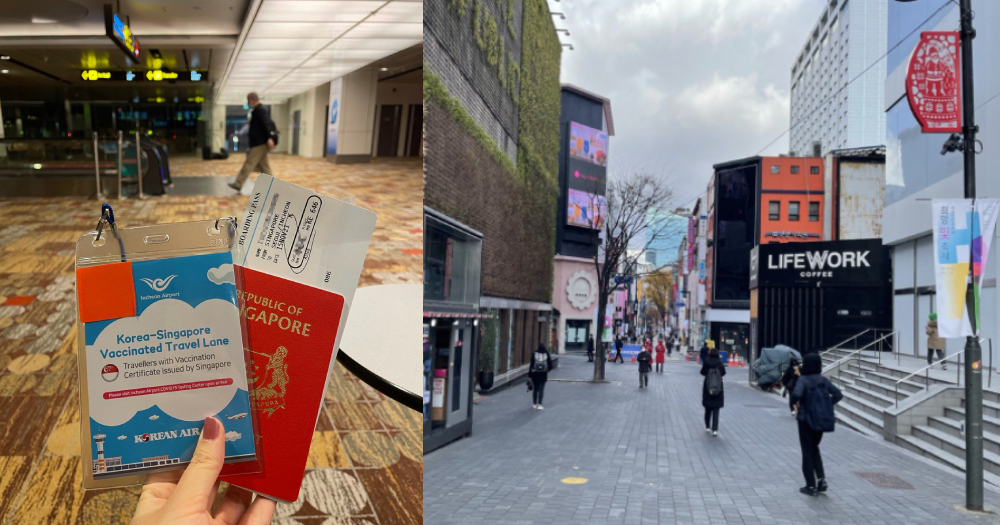Follow us on Telegram for the latest updates: https://t.me/mothershipsg
On Nov. 15, I embarked on my first trip abroad since the pandemic hit via the first Vaccinated Travel Lane (VTL) flight from Singapore to South Korea.
Shortly after our return, South Korea announced that all arrivals — both South Koreans and foreigners — will have to quarantine for 10 days from Dec. 3, regardless of their vaccination status.
However, according to a Dec. 2 update on the Embassy of the Republic of Korea's webpage, travellers under the VTL will be exempted from the quarantine.
Since I was lucky enough to be there before further uncertainties kicked in, here are ten things I learnt during my trip that may be useful for yours.
1. Travel documents and tests are a substantial surcharge
Pandemic travel comes with inevitable, additional costs due to tests and documentation.
Here’s the charges of documents that we had to prepare and Covid-19 test bookings:
- Korea Electric Travel Authorisation (K-ETA) that cost KR₩10,300 (or S$13.40, inclusive of transactional fees)
- Notarise vaccination certificate that required S$0 to generate
- Travel insurance policy that costs around S$201 for a 12-day trip
- Negative pre-departure PCR test at an authorised Singapore clinic that cost S$138
- On-arrival PCR test booking at Incheon Airport that cost KR₩174,000 (S$199.95)
- Sixth or seventh day PCR test for a trip beyond eight days at Kangbuk Samsung Hospital that cost KR₩109,089 (S$125.19)
- Pre-departure Antigen Rapid Test (ART) that cost KR₩84,000 (S$96.40)
- On-arrival PCR test booking at Changi (S$125)
The total cost of these items, including five Covid-19 tests, is almost S$900 per person, even before factoring in flight tickets, accommodation, and other expenses.
Charges for some of them may vary, depending on factors such as the length of your trip, the facility at which you take your test at, the test date (ie. weekday or weekend), and the type of test you take.
2. Ensure your documents are in order
Your passport may have expired during the prolonged inaccessibility to travel so check that your passport still has six month’s validity. If not, make sure you give yourself enough time to renew it before your trip.
Regardless if you're the one preparing your travel documents or if an agent is doing it for you, check to make sure your details are accurate so you have ample time to rectify any accidental errors.
Ensure that the flights that you have booked for your trip are VTL flights.
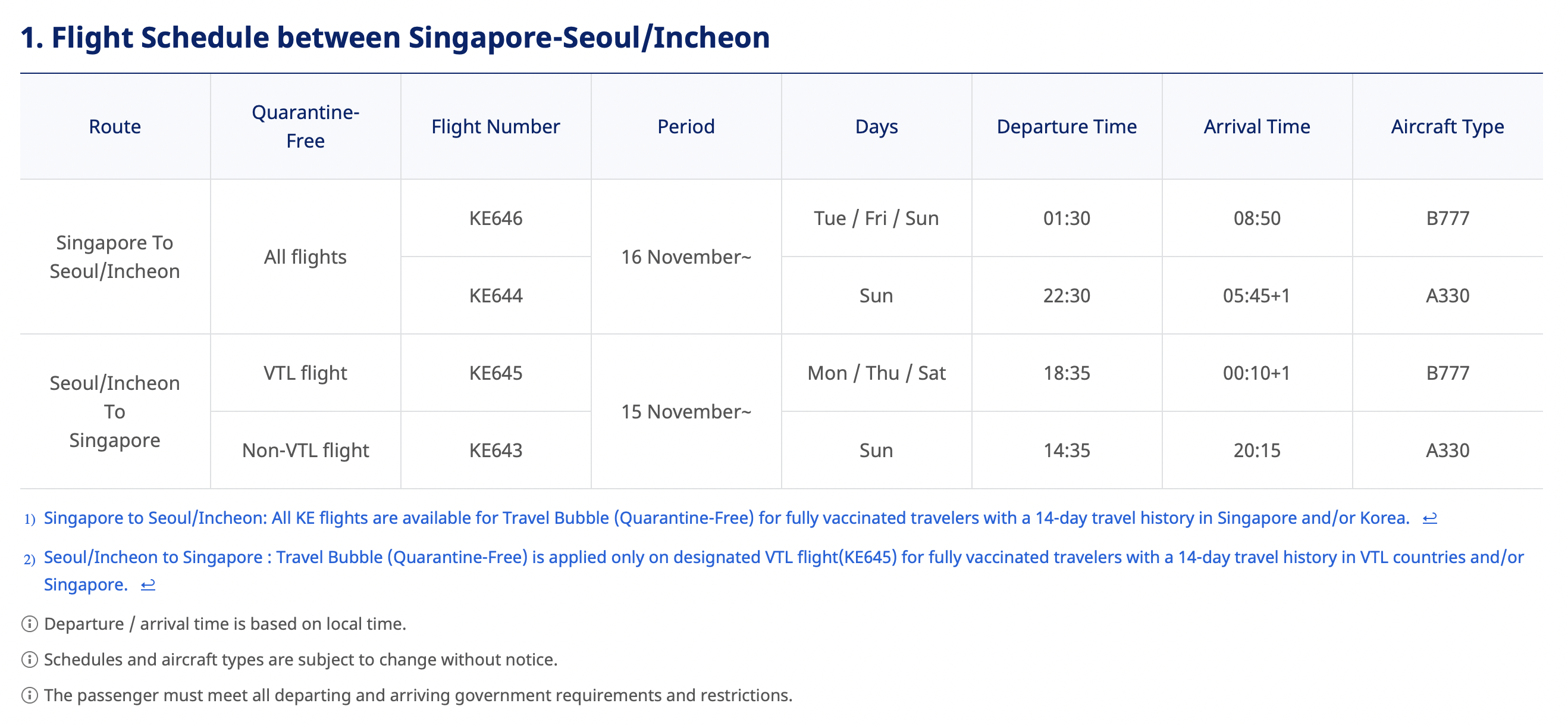 Korean Air's VTL flights to South Korea. Screen shot via koreanair.com.
Korean Air's VTL flights to South Korea. Screen shot via koreanair.com.
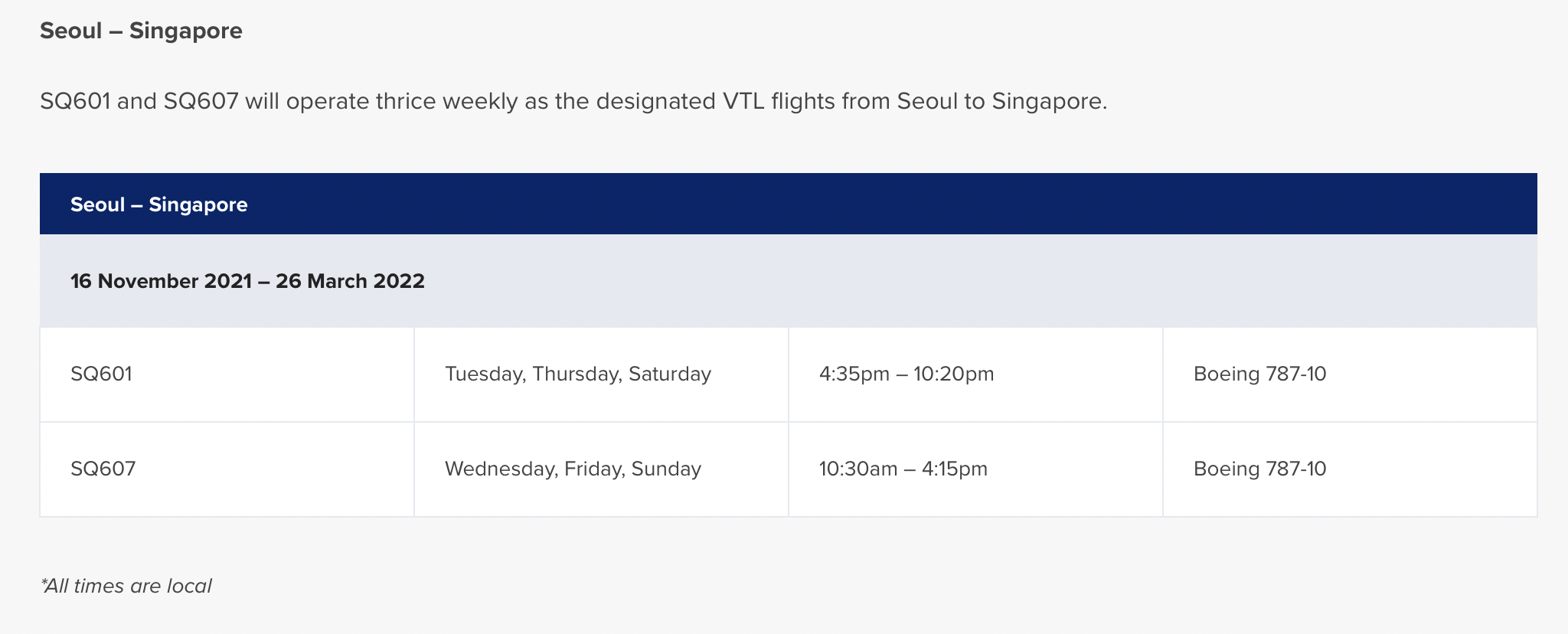 Singapore Airlines's Singapore-South Korea VTL flights. Screen shot via singaporeair.com.
Singapore Airlines's Singapore-South Korea VTL flights. Screen shot via singaporeair.com.
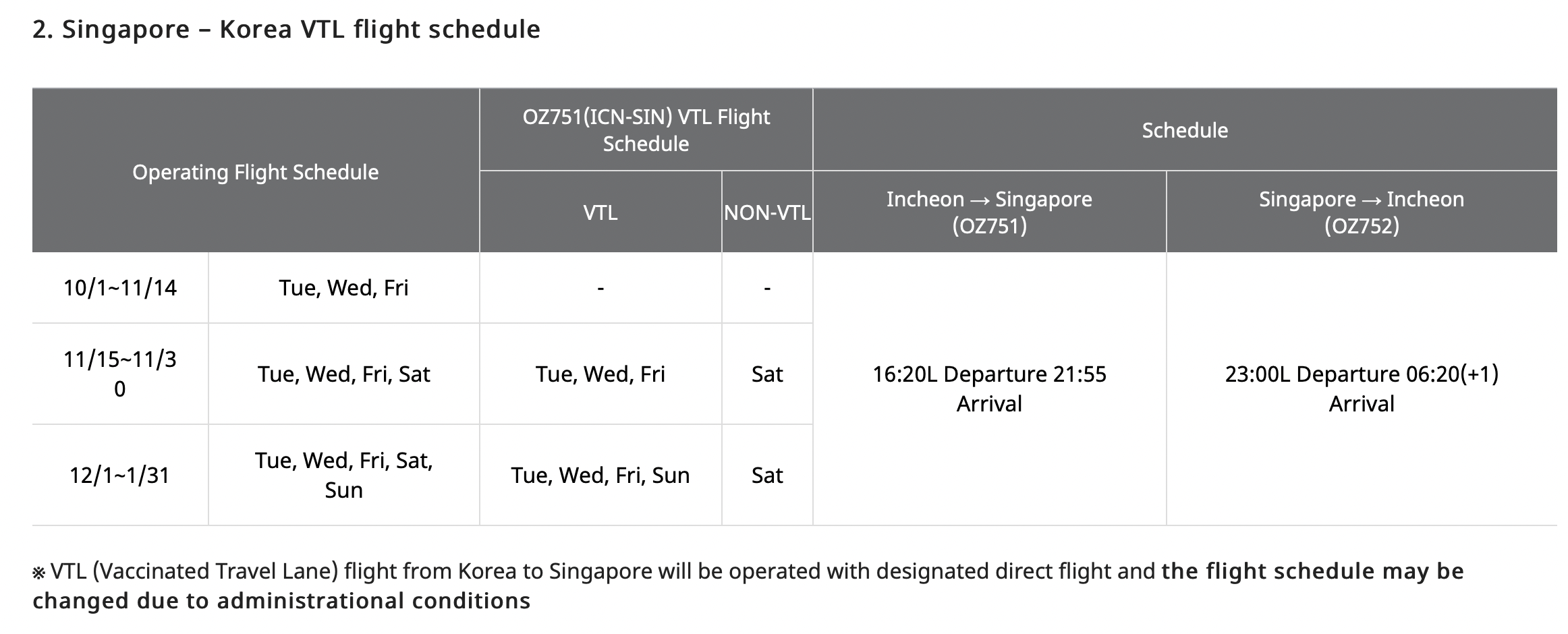 Asiana Airlines's Singapore-South Korea VTL flights. Screen shot via flyasiana.com.
Asiana Airlines's Singapore-South Korea VTL flights. Screen shot via flyasiana.com.
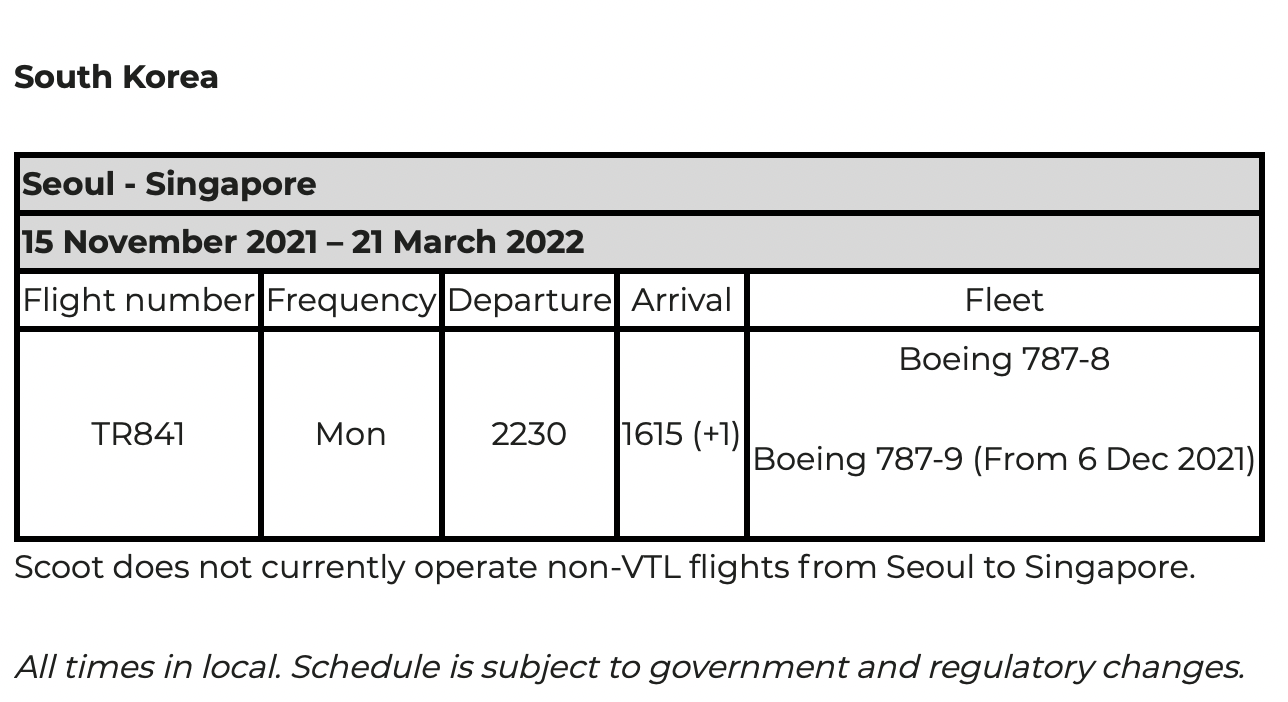 Scoot's Singapore-South Korea VTL flights. Screen shot via fly scoot.com.
Scoot's Singapore-South Korea VTL flights. Screen shot via fly scoot.com.
3. Print your documents in hard copies with extras
You have to carry hard copies of your K-ETA, Vaccination certificate with QR code, negative pre-departure PCR test result, on-arrival Covid-19 booking confirmation, and your travel insurance policy during your trip.
The Korean immigration will keep a copy of the negative pre-departure PCR test result and vaccination certificate so make sure you have extras.
4. Arrive at the airport and your gate early
The check-in counter staff will need to check your documents are in order, together with your passport. This means it can take a little longer to check-in compared to pre-Covid times.
In addition, the airport staff will check your PCR test result, together with your passport, again at the gate at Changi Airport.
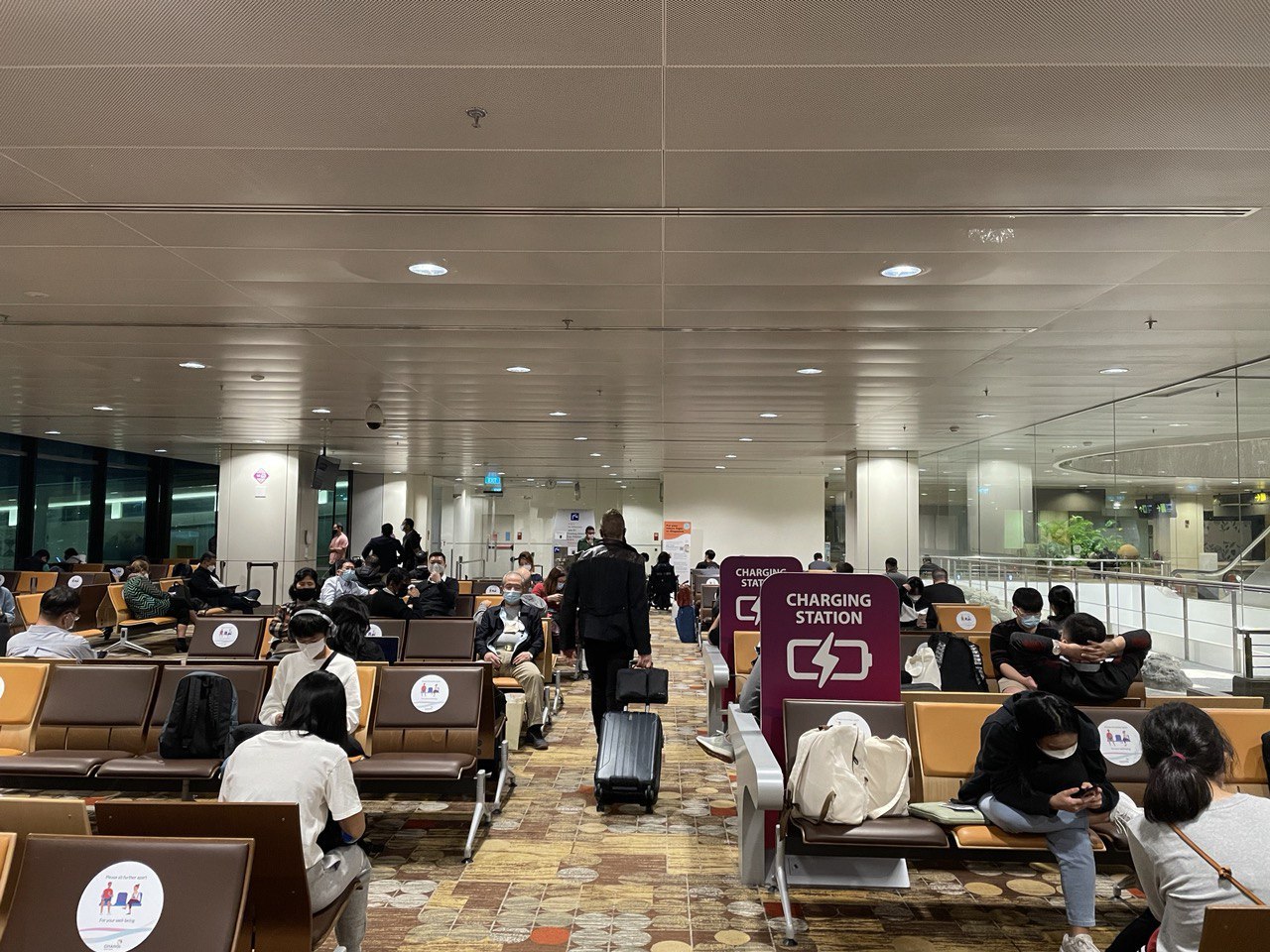 Boarding gate at Changi Airport. Photo by Karen Lui.
Boarding gate at Changi Airport. Photo by Karen Lui.
If you choose to take a pre-departure ART test at Incheon Airport on the day of your flight back to Singapore, ensure that you book it in advance and there is ample time to receive your results (at least one hour) before you check-in for your flight.
5. Covid-19 tests vary in each country
When we took our Pre-Departure PCR test at a Singapore clinic, they inserted the swab in both nostrils and twirled, which was uncomfortable but not painful.
During our on-arrival PCR test at Incheon Airport, they inserted the swab in our left nostril quite deeply in one swift motion, which resulted in a sharp pain.
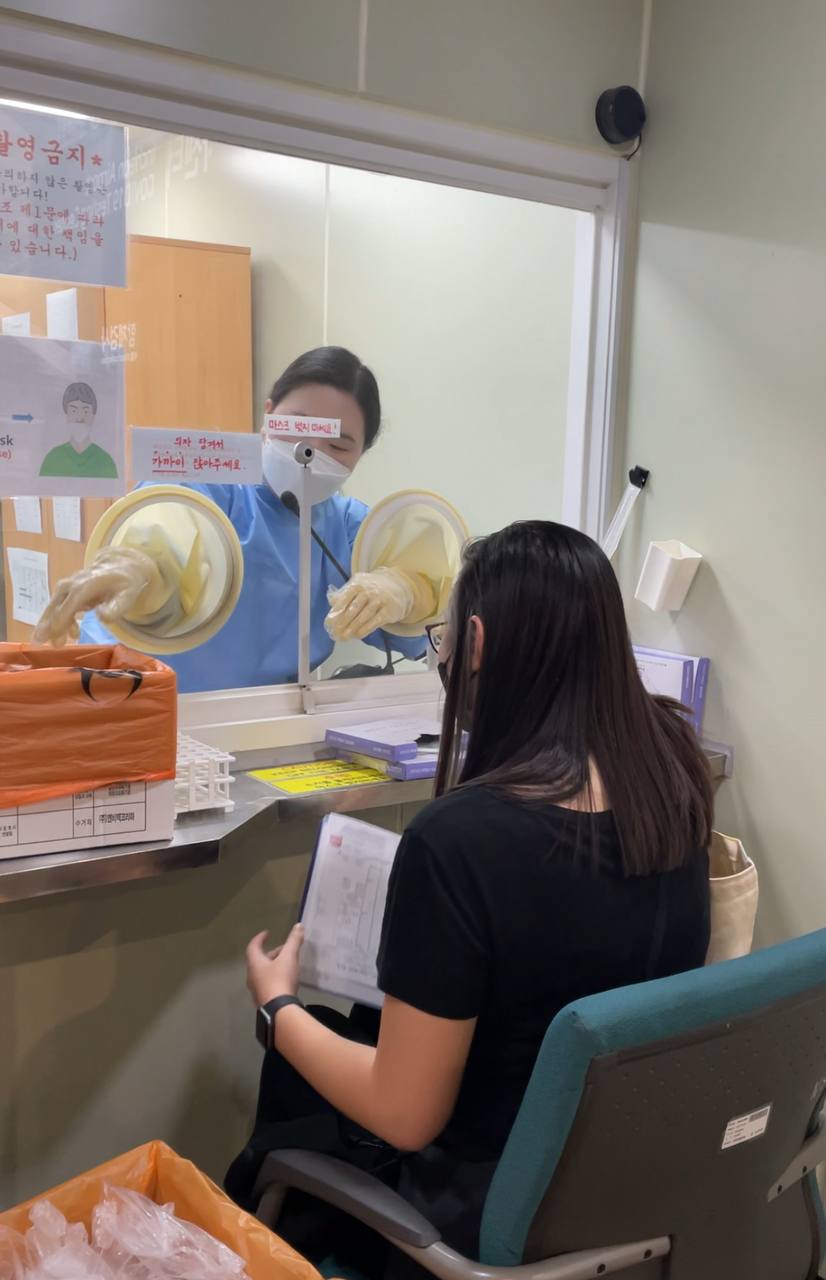 Covid-19 testing station at Incheon Airport. Photo by Karen Lui.
Covid-19 testing station at Incheon Airport. Photo by Karen Lui.
At Kangbuk Samsung Hospital, they performed a mouth swab in addition to inserting the swab in our left nostril deeply (in one swift motion once again) for our day 6 or 7 PCR test.
Despite opting to take a pre-departure ART instead of a PCR test, the medical personnel administering the test at the Incheon Airport inserted the swab as deep as a PCR test.
Our on-arrival PCR test at Changi Airport comprised a throat and nose swab, which left us gagging.
Moral of the story: you're gonna get poked in many different ways.
Where to book the tests
Appointments for pre-departure PCR tests in Singapore can be booked via Collinson or Raffles Medical.
On-arrival PCR tests at Changi Airport can be booked via Changi Airport's Safe Travel Concierge.
Appointments for PCR tests and ART at Incheon Airport's Covid-19 Test Centres can be pre-booked online.
However, we understand that Covid-19 tests at other Testing Centres in South Korea, including Kangbuk Samsung Hospital, are typically administered on a walk-in basis.
6. Expect potential queues at airports and Covid-19 testing centres
Queues may vary depending on the day, time, and venue that you are at, but here are some of our experiences.
One of us visited Raffles Medical clinic at Sembawang at 10:45am for our Pre-Departure PCR test, scheduled for 11am.
However, the test was only administered at around 12pm due to the queue.
Upon arriving in Korea, the entire immigration process at Incheon Airport took us around 1.5 hours, while queueing and taking the on-arrival PCR test took around 30 minutes, which brings us to a grand total of two hours.
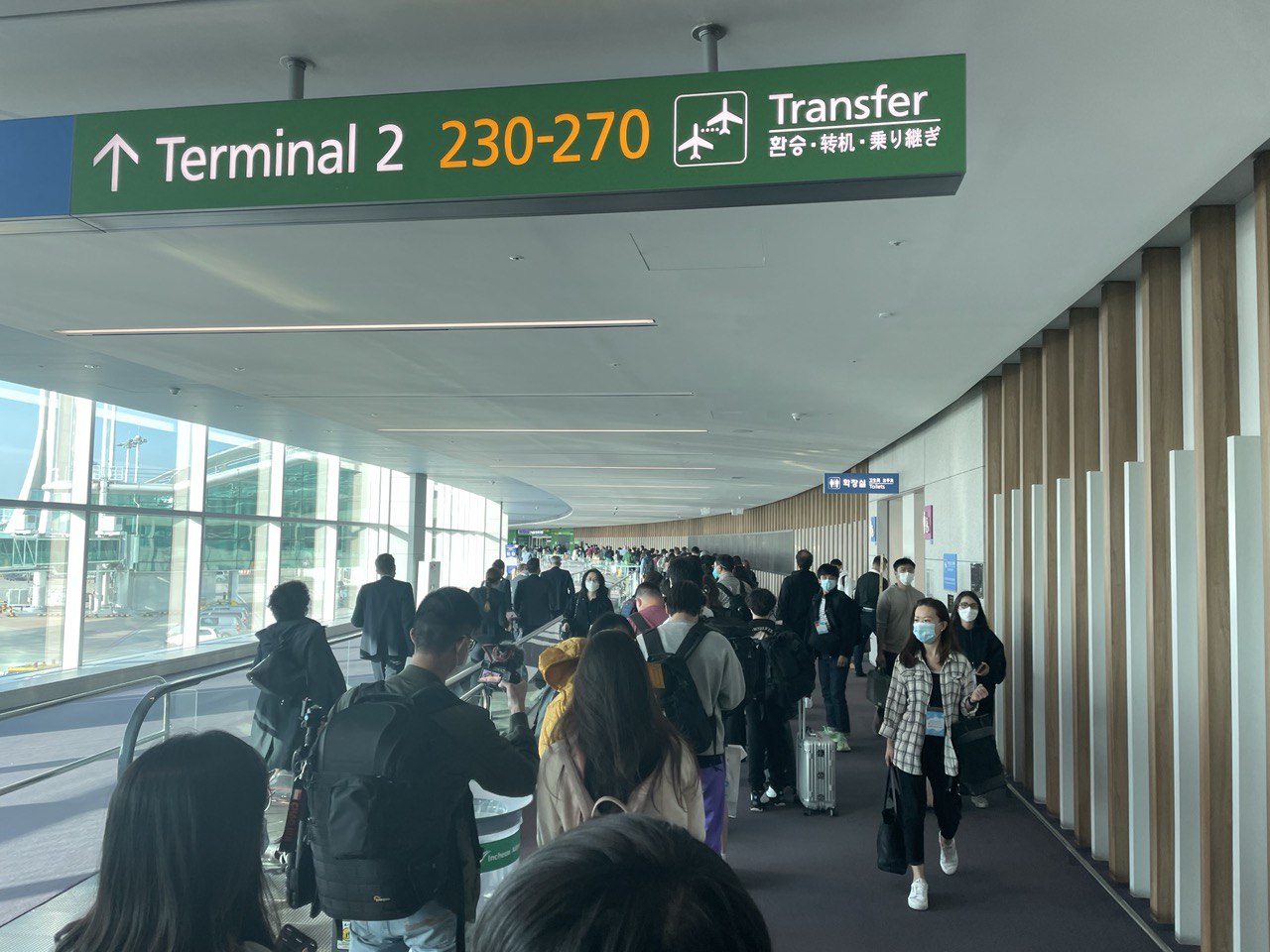 The queue we first joined upon arrival at Incheon Airport. Photo by Karen Lui.
The queue we first joined upon arrival at Incheon Airport. Photo by Karen Lui.
It took us around 1.5 hours to complete our day 6 or 7 PCR test at the Covid-19 Screening Clinic at Kangbuk Samsung Hospital in Seoul.
On the day we were flying back to Singapore, there was a snaking queue at the baggage check-in counter at Incheon Airport and it took us 50 minutes to check in our baggage.
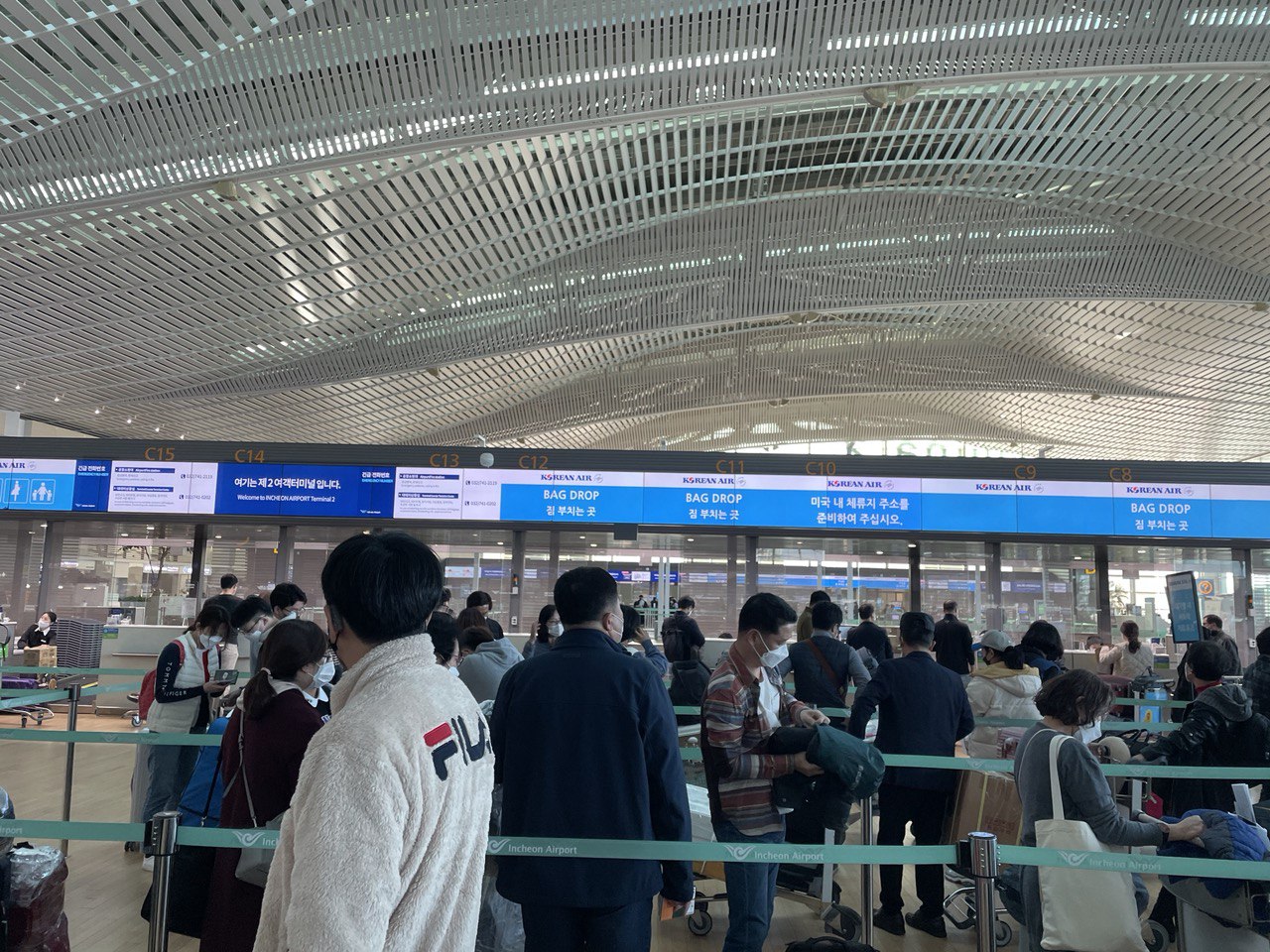 The queue at baggage check-in at Incheon Airport. Photo by Karen Lui.
The queue at baggage check-in at Incheon Airport. Photo by Karen Lui.
6. Hire a local guide if you’re unsure
There are pros and cons to travelling with a tour group as well as going free and easy on your own.
Inexperienced travellers who cannot speak Korean may prefer having a local tour guide who are familiar with the local Covid-19 restrictions.
They can also help arrange for your PCR tests in Korea, and help you check-in at eateries with minimal fuss.
If you prefer to go free and easy, ensure that you've done your homework on the requirements for travellers in order to arrange for the necessary tests and prepare the relevant documents.
7. Checking-in at eateries and large department stores can be a hassle
In South Korea, you need to check in at eateries and large department stores.
The three ways of checking in are:
- Scanning a QR code;
- Calling a phone number that is specific to each store and hanging up; or
- Writing down personal details such as time, date, name, phone number, and temperature, on a form at each store.
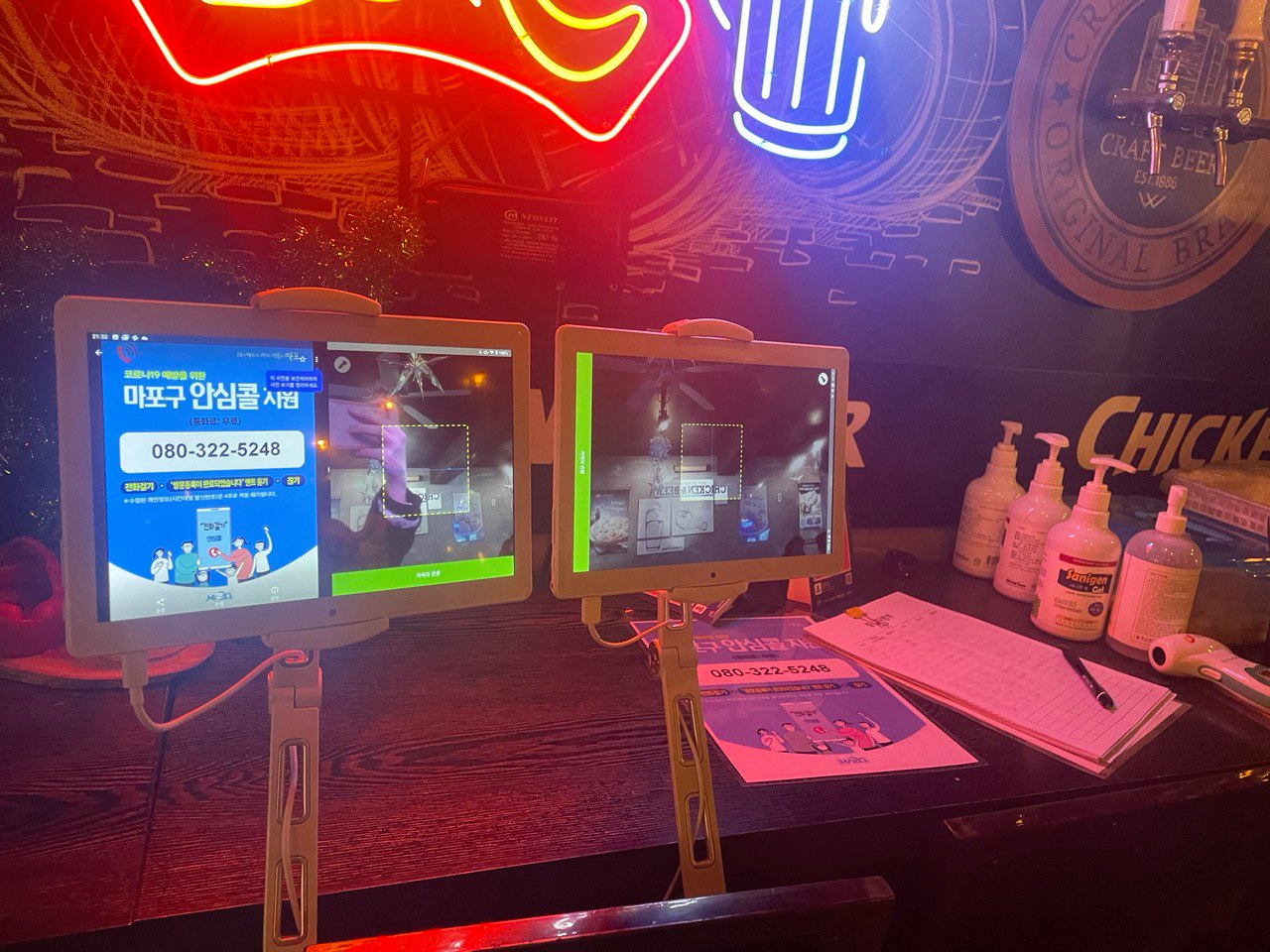 A check-in set-up at a fried chicken eatery with the QR scanning via the tablets (left), a poster with the designated phone number to call (middle), and the form to fill in your details. Photo by Karen Lui.
A check-in set-up at a fried chicken eatery with the QR scanning via the tablets (left), a poster with the designated phone number to call (middle), and the form to fill in your details. Photo by Karen Lui.
We experienced little success with the QR code scanning and heard it was only available to locals.
The calling method is not recommended unless you have a Korean phone number as it might be charged as an international call.
Despite the hassle involved, the third method is our go-to method as a foreigner without a Korean phone number. The details that the form requires vary among venues, and there may not always be English translations.
We observed that many eateries prefer the calling method and if you insist on using the third method, some may require a bit of explanation (which can be tricky if you cannot converse in Korean) before they agree to let you do so.
Note that each Korean phone number accounts for one person and you cannot check-in as a group with a single number.
Some establishments may also require you to take your temperature before entering.
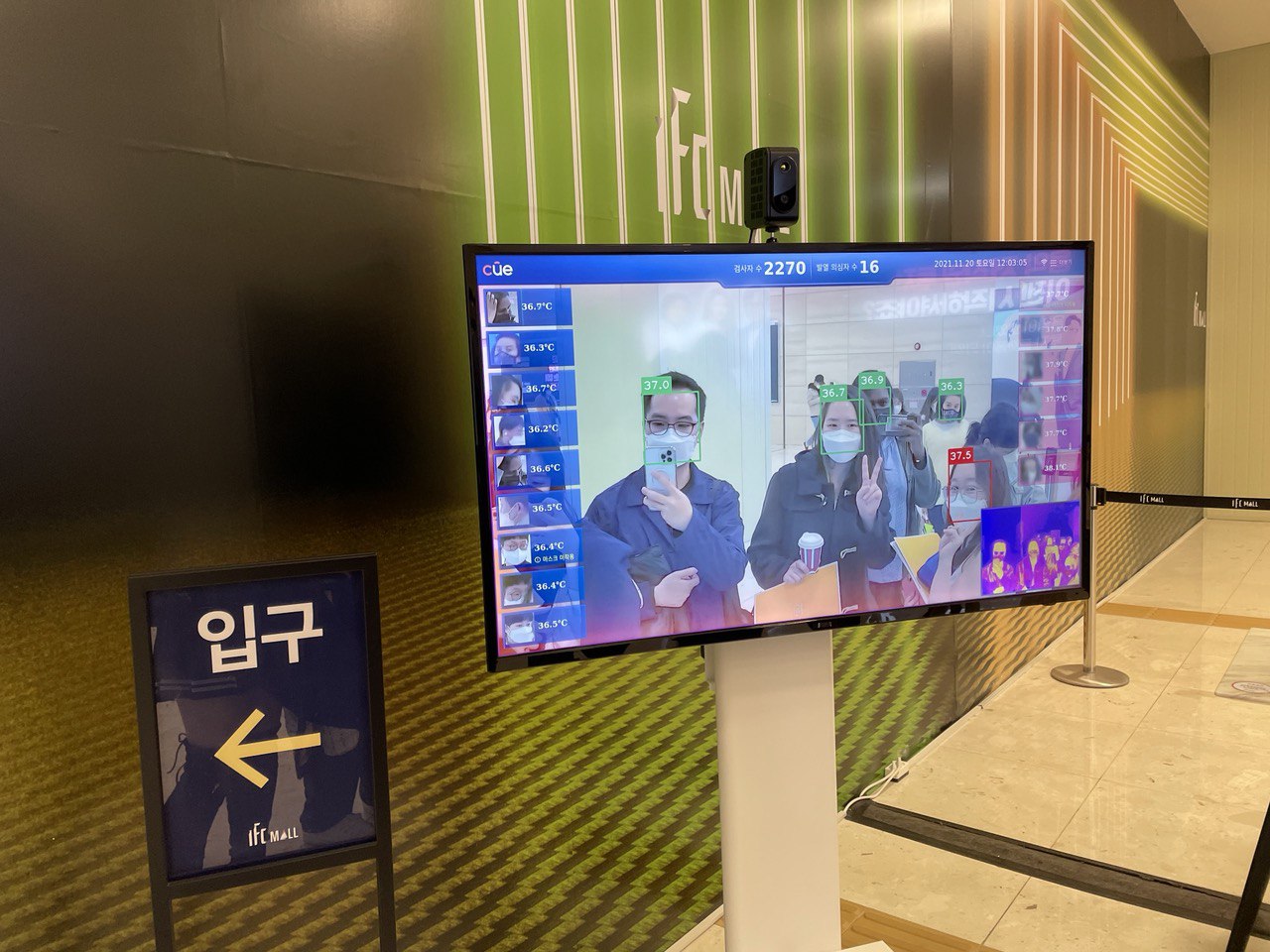 The infrared temperature screening system at the entrance of IFC mall. The accuracy is questionable as movements can easily cause your temperature reading to fluctuate between green and red within seconds. Photo by Karen Lui.
The infrared temperature screening system at the entrance of IFC mall. The accuracy is questionable as movements can easily cause your temperature reading to fluctuate between green and red within seconds. Photo by Karen Lui.
The current permitted social gathering sizes are 10 in Seoul and 12 in other regions.
Like in Singapore, masks are mandatory in South Korea.
8. Get a SIM card with functional Korean phone number
Before Covid-19, a Wi-fi egg or data-only SIM card would probably sufficient for your travel needs in South Korea.
However, we learnt that having a Korean number can potentially make things a lot easier during your trip.
In addition to allowing you to check-in more easily at eateries, you need a Korean contact number when you take any Covid-19 tests at the local screening centres.
9. Download the KDCA app for daily self-checks
Travellers will need to download the KDCA (Korea Disease Control and Prevention Agency) Quarantine-Report Self-Check app and update their health status, including symptoms and body temperature, on a daily basis during their trip.
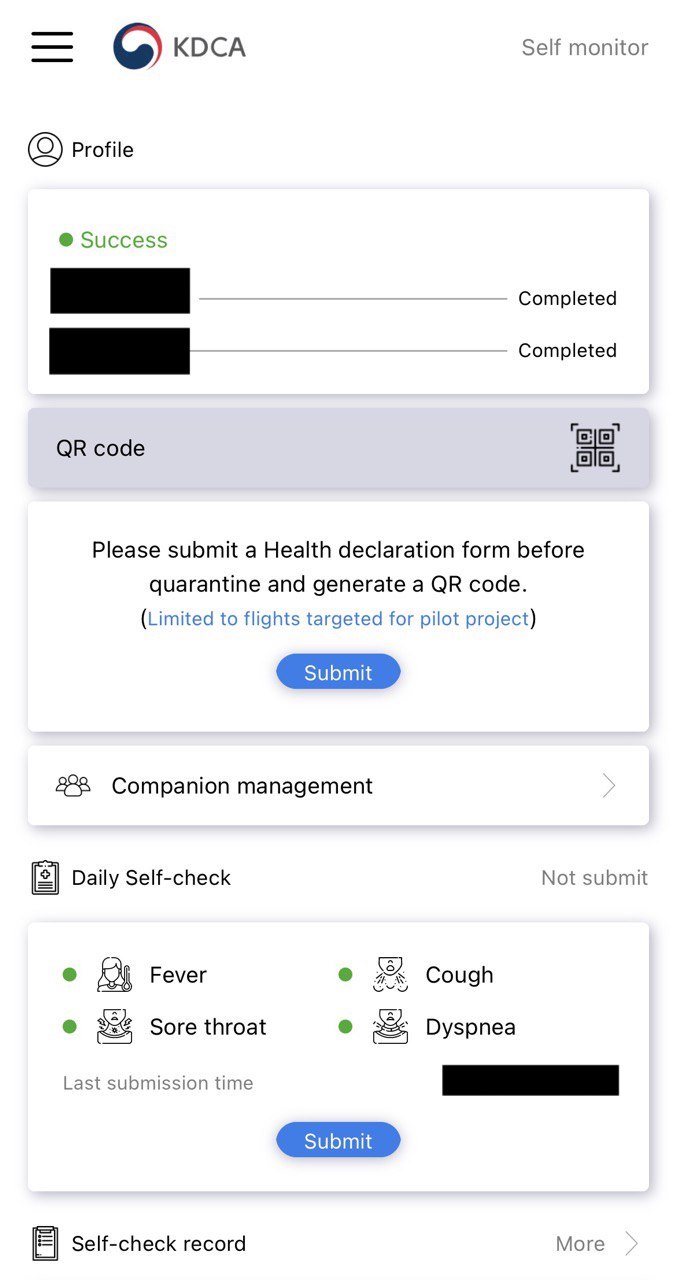
If you didn't bring a thermometer with you, fret not as most hotels, malls, and many eateries have thermometers at the entrance.
A Korean phone number is required when you register on the app.
If you do not have one, you can consider using the phone number of a Korean friend, your local tour guide, or the hotel you're staying at.
10. Travelling during a pandemic gave us anxiety
Compared to past overseas trips before the pandemic, we experienced much more stress and anxiety while preparing for it and making sure everything was in order.
The constant paranoia that something bad might happen was constantly on our minds. What if any of our Covid-19 test results turn out positive? What if we forget to book and/or go for our Covid-19 test? What if it takes too long for us to receive our Covid-19 test result?
We were also very mindful when we were out and about, especially in crowded places, and constantly washed and sanitised our hands.
While the tedious preparations and additional costs helped to minimise risk and protect the involved parties, they can also deter lazy travellers who may not be too keen on doing the extra homework.
For more information about the Singapore-South Korea VTL, check out the Embassy of the Republic of Korea's webpage.
Read more
Top images by Karen Lui.
Follow and listen to our podcast here
Top images by Karen Lui.
If you like what you read, follow us on Facebook, Instagram, Twitter and Telegram to get the latest updates.
